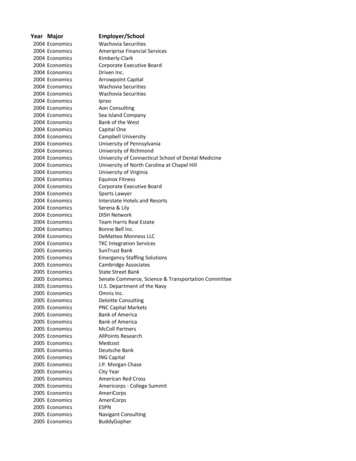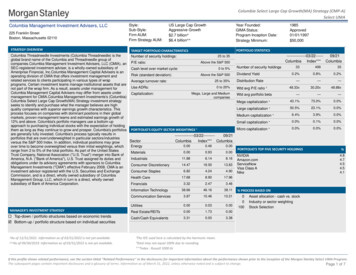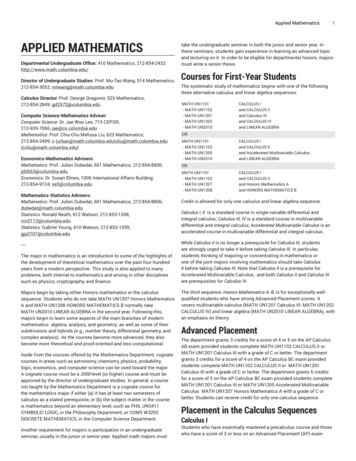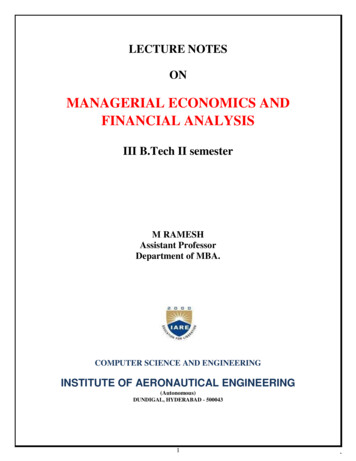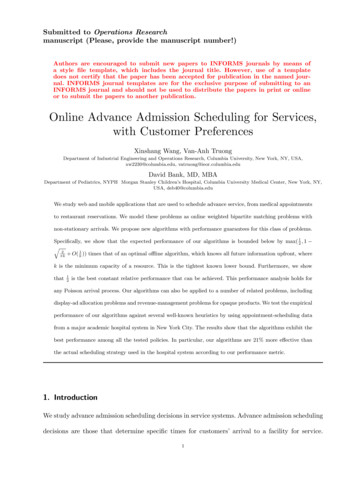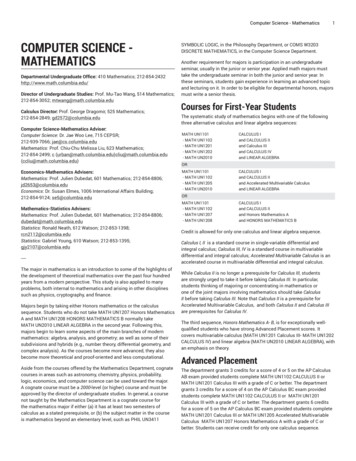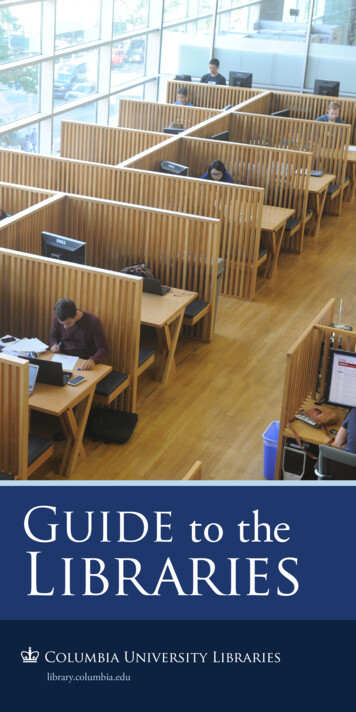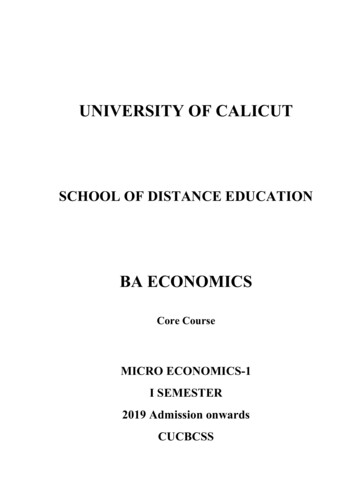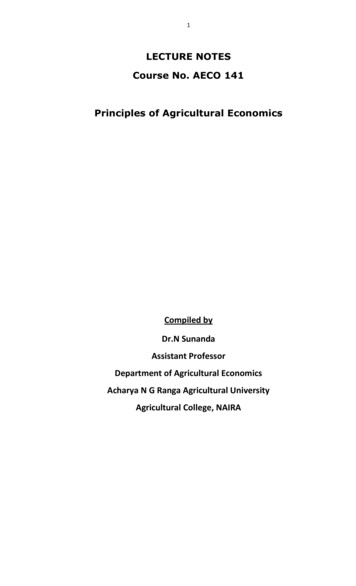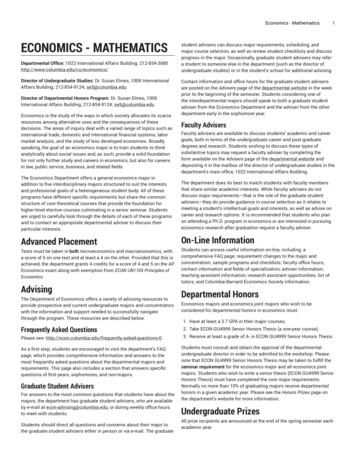
Transcription
Economics - MathematicsECONOMICS - MATHEMATICSDepartmental Office: 1022 International Affairs Building; irector of Undergraduate Studies: Dr. Susan Elmes, 1006 InternationalAffairs Building; 212-854-9124; se5@columbia.eduDirector of Departmental Honors Program: Dr. Susan Elmes, 1006International Affairs Building; 212-854-9124; se5@columbia.eduEconomics is the study of the ways in which society allocates its scarceresources among alternative uses and the consequences of thesedecisions. The areas of inquiry deal with a varied range of topics such asinternational trade, domestic and international financial systems, labormarket analysis, and the study of less developed economies. Broadlyspeaking, the goal of an economics major is to train students to thinkanalytically about social issues and, as such, provide a solid foundationfor not only further study and careers in economics, but also for careersin law, public service, business, and related fields.The Economics Department offers a general economics major inaddition to five interdisciplinary majors structured to suit the interestsand professional goals of a heterogeneous student body. All of theseprograms have different specific requirements but share the commonstructure of core theoretical courses that provide the foundation forhigher-level elective courses culminating in a senior seminar. Studentsare urged to carefully look through the details of each of these programsand to contact an appropriate departmental adviser to discuss theirparticular interests.Advanced PlacementTests must be taken in both microeconomics and macroeconomics, witha score of 5 on one test and at least a 4 on the other. Provided that this isachieved, the department grants 4 credits for a score of 4 and 5 on the APEconomics exam along with exemption from ECON UN1105 Principles ofEconomics .AdvisingThe Department of Economics offers a variety of advising resources toprovide prospective and current undergraduate majors and concentratorswith the information and support needed to successfully navigatethrough the program. These resources are described below.Frequently Asked QuestionsPlease see: s-0As a first step, students are encouraged to visit the department's FAQpage, which provides comprehensive information and answers to themost frequently asked questions about the departmental majors andrequirements. This page also includes a section that answers specificquestions of first-years, sophomores, and non-majors.Graduate Student AdvisersFor answers to the most common questions that students have about themajors, the department has graduate student advisers, who are availableby e-mail at econ-advising@columbia.edu, or during weekly office hoursto meet with students.Students should direct all questions and concerns about their major tothe graduate student advisers either in person or via e-mail. The graduate1student advisers can discuss major requirements, scheduling, andmajor course selection, as well as review student checklists and discussprogress in the major. Occasionally, graduate student advisers may refera student to someone else in the department (such as the director ofundergraduate studies) or in the student's school for additional advising.Contact information and office hours for the graduate student advisersare posted on the Advisers page of the departmental website in the weekprior to the beginning of the semester. Students considering one ofthe interdepartmental majors should speak to both a graduate studentadviser from the Economics Department and the adviser from the otherdepartment early in the sophomore year.Faculty AdvisersFaculty advisers are available to discuss students' academic and careergoals, both in terms of the undergraduate career and post-graduatedegrees and research. Students wishing to discuss these types ofsubstantive topics may request a faculty adviser by completing theform available on the Advisers page of the departmental website anddepositing it in the mailbox of the director of undergraduate studies in thedepartment's main office, 1022 International Affairs Building.The department does its best to match students with faculty membersthat share similar academic interests. While faculty advisers do notdiscuss major requirements—that is the role of the graduate studentadvisers—they do provide guidance in course selection as it relates tomeeting a student's intellectual goals and interests, as well as advise oncareer and research options. It is recommended that students who planon attending a Ph.D. program in economics or are interested in pursuingeconomics research after graduation request a faculty adviser.On-Line InformationStudents can access useful information on-line, including: acomprehensive FAQ page; requirement changes to the major andconcentration; sample programs and checklists; faculty office hours,contact information and fields of specialization; adviser information;teaching assistant information; research assistant opportunities; list oftutors; and Columbia-Barnard Economics Society information.Departmental HonorsEconomics majors and economics joint majors who wish to beconsidered for departmental honors in economics must:1. Have at least a 3.7 GPA in their major courses;2. Take ECON GU4999 Senior Honors Thesis (a one-year course);3. Receive at least a grade of A- in ECON GU4999 Senior Honors Thesis.Students must consult and obtain the approval of the departmentalundergraduate director in order to be admitted to the workshop. Pleasenote that ECON GU4999 Senior Honors Thesis may be taken to fulfill theseminar requirement for the economics major and all economics jointmajors. Students who wish to write a senior thesis (ECON GU4999 SeniorHonors Thesis) must have completed the core major requirements .Normally no more than 10% of graduating majors receive departmentalhonors in a given academic year. Please see the Honors Prizes page onthe department's website for more information.Undergraduate PrizesAll prize recipients are announced at the end of the spring semester eachacademic year.
2Economics - MathematicsSanford S. Parker PrizeEstablished in 1980, this prize is awarded annually to a Columbia Collegegraduating student who majored or concentrated in economics and planson continuing his or her studies in an economics Ph.D. program withinthe two years following his or her graduation.Jennifer La'OQingmin LiuAssistant ProfessorsEstablished in 1997, this prize is awarded annually to two students(Columbia College or General Studies) majoring in economics: one for thebest honors thesis paper, and the other for the best economics seminarpaper.Hassan AfrouziMichael BestAndres DrenikMatthieu GomezEmilien Gouin-BonenfantReka JuhaszElliot LipnowskiJose Luis Montiel OleaEvan SadlerJack WillisParker Prize for Summer ResearchLecturersThe Dean’s Prize in EconomicsAwarded to General Studies students for excellence in the study ofEconomics.Romine PrizeThe department provides financial support for five Columbia Collegeunderclassmen who take unpaid summer internships that focus onresearch.ProfessorsDouglas Almond (also School of International and Public Affairs)Jushan BaiJagdish N. BhagwatiSandra BlackPatrick Bolton (also Business School)Alessandra Casella (also Political Science Department)Yeon-Koo ChePierre-André ChiapporiGraciela ChichilniskyRichard Clarida (also School of International and Public Affairs)Donald DavisPrajit DuttaHarrison HongR. Glenn Hubbard (also Business School)Navin KartikWojciech Kopczuk (also School of International and Public Affairs)Sokbae (Simon) LeeW. Bentley McLeod (also School of International and Public Affairs)Suresh Naidu (also School of International and Public Affairs)Serena NgBrendan O'FlahertyEdmund S. PhelpsAndrea Prat (also Business School)Jeffrey Sachs (also Earth Institute)Xavier Sala-i-MartinBernard SalaniéJosé A. ScheinkmanStephanie Schmitt-GrohéJoseph Stiglitz (also Business School)Martín UribeMiguel Urquiola (Chair) (also School of International and Public Affairs)Eric Verhoogen (also School of International and Public Affairs)David WeinsteinMichael WoodfordAssociate ProfessorsMark DeanLena EdlundIrasema AlonsoTri Vi DangCeyhan ElginSusan ElmesSeyhan ErdenTamrat GashawSunil GulatiRonald MillerWouter VergoteAdjunct FacultyClaudia HalbacNeal MasiaCaterina MusattiWaseem NoorIngmar NymanOn LeaveProfs. Almond, Clarida, Gomez, Juhasz, La'O, Wills (2020-2021)Profs. Bhagwati, Lee, Phelps, Sadler, Woodford (Fall 2020)Profs. Casella, Dean, Edlund, Kartik, Montiel Olea, Ng (Spring 2021)Guidelines for all Economics Majors,Concentrators, and InterdepartmentalMajorsChecklists and RequirementChecklists and Requirement information are available on the Departmentwebsite.Course ListEconomics Core CoursesAll of the core courses must be completed no later than the springsemester of the student’s junior year and must be taken at Columbia.Students who take any core course during the fall semester of their senioryear must obtain written permission from the department's director ofundergraduate studies. Unless otherwise specified below, all studentsmust complete the following core courses:ECON UN1105Principles of EconomicsECON UN3211Intermediate Microeconomics
Economics - MathematicsECON UN3213Intermediate MacroeconomicsECON UN3412Introduction To EconometricsPrerequisitesCourse prerequisites are strictly enforced. Prerequisites must be takenbefore the course, not after or concurrently.Economics courses taken before the completion of any of itsprerequisites, even with instructor approval, are not counted towardthe major, concentration, or interdepartmental majors. Exemptionsfrom a prerequisite requirement may only be made, in writing, by thedepartment's director of undergraduate studies. Credits from a coursetaken prior to the completion of its prerequisites are not counted towardsthe major requirements. As a consequence, students are required tocomplete additional, specific courses in economics at the direction of thedirector of undergraduate studies.ECON GU4230 Economics of NewYork CityECON GU4260 Market DesignECON GU4280 CORPORATEFINANCEECON GU4370 Political EconomyECON GU4700 Financial CrisesECON GU4710 FINANCE AND THEREAL ECONOMYECON GU4850 CognitiveMechanisms and EconomicBehaviorECON UN3213 IntermediateMacroeconomicsSTAT UN1201 Calculus-BasedIntroduction to StatisticsECON GU4860 Behavioral FinanceECON UN3211 IntermediateMicroeconomicsECON UN3213 IntermediateMacroeconomicsECON UN3412 Introduction ToEconometricsThe prerequisites for required courses are as follows:CoursePrerequisitesECON UN1105 Principles ofEconomicsMATH UN1101 CALCULUS INoneSTAT UN1201 Calculus-BasedIntroduction to StatisticsMATH UN1101 CALCULUS IECON UN3211 IntermediateMicroeconomicsECON UN1105 Principles ofEconomicsMATH UN1201 Calculus III orUN1205ECON UN3213 IntermediateMacroeconomicsECON UN1105 Principles ofEconomicsMATH UN1101 CALCULUS ICo-requisite:MATH UN1201 Calculus III orUN1205ECON UN3412 Introduction ToEconometricsMATH UN1201 Calculus III orUN1205ECON UN3211 IntermediateMicroeconomics or UN3213STAT UN1201 Calculus-BasedIntroduction to StatisticsECON 2000-level electivesECON UN1105 Principles ofEconomicsECON GU4211 AdvancedMicroeconomicsECON UN3211 IntermediateMicroeconomicsECON UN3213 IntermediateMacroeconomicsMATH UN2010 LINEAR ALGEBRACorequisites:MATH UN2500 ANALYSIS ANDOPTIMIZATION or GU4061ECON GU4412 AdvancedEconometricsECON GU4213 AdvancedMacroeconomicsECON GU4413 Econometrics ofTime Series and ForecastingECON UN3211 IntermediateMicroeconomicsECON UN3213 IntermediateMacroeconomicsECON UN3412 Introduction ToEconometricsMATH UN2010 LINEAR ALGEBRAECON UN3025 Financial Economics ECON UN3211 IntermediateECON GU4020 Economics ofMicroeconomicsUncertainty and Information3All other ECON 3000- and 4000-level ECON UN3211 IntermediateelectivesMicroeconomicsECON UN3213 IntermediateMacroeconomicsECON UN3901 Economics ofEducationECON UN3952 Seminar inMacroeconomics and Formation ofExpectationsECON UN3981 AppliedEconometricsECON GU4911 MICROECONOMICSSEMINARECON GU4913 MACROECONOMICSSEMINARECON GU4918 Seminar InEconometricsECON UN3211 IntermediateMicroeconomicsECON UN3213 IntermediateMacroeconomicsECON UN3412 Introduction ToEconometricsECPS GU4921 Seminar In PoliticalEconomyECON UN3211 IntermediateMicroeconomicsECON UN3213 IntermediateMacroeconomicsECON UN3412 Introduction ToEconometricsECON GU4370 Political EconomyECPH GU4950 Economics andPhilosophy SeminarECON UN3211 IntermediateMicroeconomicsECON UN3213 IntermediateMacroeconomicsECON UN3412 Introduction ToEconometricsBarnard electivesSee Barnard bulletinIt is strongly recommended that students take ECON UN3412Introduction To Econometrics in the semester immediately following thecompletion of the statistics course.GradingNo course with a grade of D or lower, including calculus and statisticscourses, can count toward the major, concentration, or interdepartmentalmajors. Economics core courses with a grade of D or F must be retakenand completed with a grade of C- or better.
4Economics - MathematicsStudents who receive a grade of D or F in a core course are permittedto take a higher-level elective course that has that core course as aprerequisite, so long as it is taken concurrently with the retaking of thatcore course. For example, if a student fails ECON UN3211 IntermediateMicroeconomics, the student must retake it and, in the same semester,may enroll in an elective course for which it is a prerequisite, providedthat all other prerequisites for the elective have been completed. Thesame rule applies to the required math and statistics courses. Forexample, if a student fails MATH UN1201 Calculus III , the student mayretake calculus III concurrently with Intermediate Microeconomics.Students who must retake any core economics or math course maynot retake it concurrently with a senior seminar; the economics corecourses ECON UN3211 Intermediate Microeconomics , ECON UN3213Intermediate Macroeconomics , and ECON UN3412 Introduction ToEconometrics must be successfully completed before a student mayenroll in a seminar.A grade of W is not equivalent to a grade of D or F; it does not qualify astudent to retake the course concurrently with a higher level course thatlists the course as a prerequisite. Students who receive a grade of W in acore course must complete the course with a grade of C- or better beforetaking a course that lists it as a prerequisite.Only ECON UN1105 Principles of Economics may be taken for agrade of Pass/D/Fail, and the student must receive a grade of P forit to count towards the requirements for the major, concentration, orinterdepartmental majors.Economics ElectivesOnly those courses identified in the Economics Department listings inthis Bulletin may be taken for elective credit. All 3000-level or higherelectives offered by the Economics Department have ECON UN3211Intermediate Microeconomics and ECON UN3213 IntermediateMacroeconomics as prerequisites. However, some electives haveadditional prerequisites and students should ensure that all prerequisiteshave been completed (see the table of prerequisites printed above).Seminars do not count as electives.MATH UN1101- MATH UN1205CALCULUS Iand Accelerated Multivariable CalculusMATH UN1207- MATH UN1208Honors Mathematics Aand HONORS MATHEMATICS BIn addition:1. Students who receive a grade of D or F in MATH UN1201 CalculusIII or MATH UN1205 must retake the course, but may enroll inECON UN3211 Intermediate Microeconomics.2. Students who receive a grade of D or F in MATH UN1207 HonorsMathematics A may either retake the course, or take MATH UN1201Calculus III or MATH UN1205, and enroll in ECON UN3211Intermediate Microeconomics concurrently.StatisticsUnless otherwise specified below, all students must take STAT UN1201Calculus-Based Introduction to Statistics, or a higher level course, suchas STAT GU4204 Statistical Inference, or STAT GU4001.Barnard CoursesA limited number of Barnard economics electives may count toward themajor, concentration, and interdepartmental majors. Students shouldpay careful attention to the limit of Barnard electives indicated in theirprogram requirements. Please see the Transfer Credit section below forinformation on the number of Barnard electives that may be taken tofulfill major requirements. In addition, students may receive credit forthe major, concentration, and interdepartmental majors only for thoseBarnard economics courses listed in this Bulletin. However, students maynot receive credit for two courses whose content overlaps. Barnard andColumbia economics electives with overlapping content include but arenot limited to:ECON BC3029- ECON GU4321Empirical Development Economicsand Economic DevelopmentECON BC3038- ECON GU4505International Money and Financeand International MacroeconomicsECON BC3019- ECON GU4400Labor Economicsand Labor EconomicsSeminars can be taken only after all of the required core courses ineconomics have been successfully completed. Students may not takeor re-take ECON UN3211 Intermediate Microeconomics, ECON UN3213Intermediate Macroeconomics, or ECON UN3412 Introduction ToEconometrics concurrently with any senior seminar. Seminars donot count as electives. Each seminar is limited to sixteen students,with priority given to seniors. For ECPS GU4921 Seminar In PoliticalEconomy and ECPH GU4950 Economics and Philosophy Seminar, priorityis given to economics–political science and economics-philosophymajors, respectively.ECON BC3047- ECON GU4500International Tradeand International TradeECON BC3039- ECON GU4625Environmental and Natural ResourceEconomicsand Economics of the EnvironmentECON BC3041- ECON GU4235Theoretical Foundations of PoliticalEconomyand HISTORICAL FOUNDATIONS OFMODERN ECONOMICS: Adam Smith to JM KeynesECON GU4400Labor EconomicsFor seminar registration details, read the information posted on thedepartment's Senior Seminar Registration page: ion.ECON GU4235HISTORICAL FOUNDATIONS OFMODERN ECONOMICS: Adam Smith to JM KeynesMathematicsStudents should always first consult with econ-advising to confirm thatthe Barnard elective they wish to take does not overlap with a Columbiaelective that they have already taken or plan to take. Students may nottake the Barnard core economics, math, statistics, or seminar courses forcredit towards the completion of major requirements.SeminarsStudents must consult with the Mathematics Department for theappropriate placement in the calculus sequence. Students mustcomplete one of the following sequences:Select one of the following sequences:MATH UN1101- MATH UN1201CALCULUS Iand Calculus IIISchool of Professional Studies CoursesThe Department of Economics does not accept any of the coursesoffered through the School of Professional Studies for credit towards the
Economics - Mathematicseconomics major, concentration, or interdepartmental majors with theexception of the courses offered by the Economics Department duringthe summer session at Columbia.Other Department and School CoursesPlease note that with the exception of the above Barnard courses andthe specific courses listed below for the financial economics major, noother courses offered through the different departments and schools atColumbia count toward the economics majors or concentration.Transfer CreditsSummer courses taken at other institutions must be approved in writingby the department's transfer credit adviser before the course is taken.The department does not accept transfer credits for any 3000 level corecourses taken during a summer session outside of Columbia University.Summer courses taken from the department of economics at ColumbiaUniversity do not need approval.Guidelines and instructions on how to request transfer credit approvalcan be found in the Transfer Credit Information page of the departmentalwebsite.Students are required to take a minimum number of courses in theColumbia Economics Department. For all majors and interdepartmentalmajors, students must complete a minimum of five lecture courses in theColumbia department. Students may fulfill their remaining requirementsfor economics lecture courses through AP (or IB or GCE) credits, Barnardelectives, transfer courses, and study abroad courses (the latter two aresubject to the approval of the Economics Department). The followingtable summarizes the new rules:Major in EconomicsProgramMinimum number Maximumwhich must benumber oftaken in theoutside alloweddepartmentEconomics Core CoursesEconomics major 954StatisticsFinancialeconomics853Select a statistics courseEconomicsmathematics752Select at least five electives, of which no more than one may be taken atthe 2000-level (including Barnard courses)Economics7political 752Economicsconcentration743Number ofrequiredeconomicslecture courses1. Lecture courses do not include seminars, which must be taken inthe Columbia Economics Department. The lecture course countsare counts of economics courses only and do not include math,statistics, or courses in other departments;2. At least two of the three 3000-level economics core courses must betaken in the department and no corresponding Barnard courses areaccepted. ECON UN3025 Financial Economics and ECON UN3265MONEY AND BANKING are counted as departmental coursesregardless of the instructor;3. Outside courses include AP (or IB or GCE) credits, transfer credits,Barnard 2000- and 3000-level elective courses and transfer creditsfrom other universities. In the case where two or more courses takenoutside of Columbia are used as the equivalent of ECON UN1105Principles of Economics, those courses are counted as one transfercourse.Approval of transfer credits to fulfill economics requirements mustbe obtained in writing from the Department of Economics (see thedepartmental website or speak with your advising dean for informationregarding applications for transfer credit). Approval is granted onlyfor courses that are considered to be comparable to those offered atColumbia.5Please read Guidelines for all for Economics Majors, Concentrators, andInterdepartmental Majors (p. 2) above.The economics major requires a minimum of 35 points in economics, 6points in mathematics, and 3 points in statistics, for a total of at least 44points as follows:All economics core coursesMathematicsSelect a mathematics sequenceEconomics ElectivesEconomics SeminarSelect one economics seminar courseConcentration in EconomicsPlease read Guidelines for all for Economics Majors, Concentrators, andInterdepartmental Majors (p. 2) above.The economics concentration requires a minimum of 25 points ineconomics, 6 points in mathematics, and 3 points in statistics, for a totalof at least 34 points as follows:Economics Core CoursesAll economics core coursesMathematicsSelect a mathematics sequenceStatisticsSelect a statistics courseEconomics ElectivesSelect at least three electives, of which no more than one may be takenat the 2000-level (including Barnard courses)Major in Financial EconomicsPlease read Guidelines for all for Economics Majors, Concentrators, andInterdepartmental Majors (p. 2) above.The Department of Economics offers the major in financial economics,which provides an academic framework to explore the role of financialmarkets and intermediaries in the allocation (and misallocation) ofcapital. Among the topics studied in financial economics are financial
6Economics - Mathematicsmarkets, banks and other financial intermediaries, asset valuation,portfolio allocation, regulation and corporate governance.IEOR E3106STOCHASTIC SYSTEMS ANDAPPLICATIONSIEOR E4700INTRO TO FINANCIAL ENGINEERINGMATH UN3050Discrete Time Models in FinancePOLS UN3630Politics of International EconomicRelationsSTAT W3201Math Finance in Continuous TimeEconomics Core CoursesSTAT GU4261Statistical Methods in FinanceAll economics core coursesSTAT GU4207Elementary Stochastic ProcessesSTAT GU4262Stochastic Processes for FinanceThe financial economics major requires 26 points in economics, 6 pointsin mathematics, 3 points in statistics, 3 points in business, and 12 pointsfrom a list of selected courses for a total minimum of 50 points asfollows:Finance Core Courses*ECON UN3025Financial EconomicsSeminarECON GU4280CORPORATE FINANCEBUSI UN3013Financial AccountingThe seminar must be chosen from a list of seminars eligible forthe financial economics major. The department indicates whichseminars are eligible for the major on the Senior Seminars page of thedepartmental website.*NOTE: The department considers BUSI UN3013 and IEOR E2261 asoverlapping courses. Students who take both courses shall be creditedwith one course only. Financial economics majors who are also in theBusiness Management concentration program (CNBUMG) must takean additional elective from either the financial economics prescribedelective list (below) or from the CNBUMB prescribed list.MathematicsSelect a mathematics sequenceStatistics*Students must complete the finance core no later than fall of their senioryear.Major in Economics-MathematicsSelect a statistics courseElectivesSelect four of the following, of which two must be from the Columbiaor Barnard economics departments, or equivalent economics transfercredits:ECON BC3014EntrepreneurshipECON BC3017Economics of Business OrganizationECON UN3265MONEY AND BANKINGECON UN3952Seminar in Macroeconomics andFormation of ExpectationsECON GU4020Economics of Uncertainty andInformationECON GU4213Advanced MacroeconomicsECON GU4251Industrial OrganizationECON GU4260Market DesignECON GU4412Advanced EconometricsECON GU4415Game TheoryECON GU4465Public EconomicsECON GU4500International TradeECON GU4505International Macroeconomicsor ECON BC3038Students must have completed at least one of ECON UN3025 orECON GU4280 prior to taking their senior seminar.International Money and FinanceECON G4526Transition Reforms, Globalization andFinancial CrisisECON GU4700Financial CrisesECON GU4710FINANCE AND THE REAL ECONOMYECON GU4840BEHAVIORAL ECONOMICSECON GU4850Cognitive Mechanisms and EconomicBehaviorECON GU4860Behavioral FinanceBIOT GU4180BUSI UN3021Marketing ManagementBUSI UN3701STRATEGY FORMULATIONBUSI UN3702Venturing to Change the WorldBUSI UN3703Leadership in OrganizationsBUSI UN3704Making History Through VenturingCOMS W1002COMPUTING IN CONTEXTHIST W2904History of FinancePlease read Guidelines for all for Economics Majors, Concentrators, andInterdepartmental Majors (p. 2) above.The major in economics and mathematics provides students with agrounding in economic theory comparable to that provided by the generaleconomics major and exposes students to rigorous and extensivetraining in mathematics. The program is recommended for any studentplanning to do graduate work in economics.The Department of Economics has graduate student advisers with whomstudents may consult on economics requirements. The Department ofMathematics has an assigned adviser with whom students may consulton mathematics requirements. The economics adviser can only adviseon economics requirements; the mathematics adviser can only advise onmathematics requirements.The economics-mathematics major requires a total of 52 or 56 points(depending on mathematics sequence) : 29 points in economics and23-27 points in mathematics and statistics as follows:Economics Core CoursesAll economics core coursesEconomics ElectivesSelect three electives at the 3000-level or aboveMathematicsSelect one of the following sequences:MATH UN1101- MATH UN1102- MATH UN1201- MATH UN2010CALCULUS Iand CALCULUS IIand Calculus IIIand LINEAR ALGEBRAMATH UN1101- MATH UN1102- MATH UN1205- MATH UN2010CALCULUS Iand CALCULUS IIand Accelerated Multivariable Calculusand LINEAR ALGEBRAMATH UN1207- MATH UN1208Honors Mathematics Aand HONORS MATHEMATICS BNote: Students who take MATH UN1205 may not receive credit for bothMATH UN1201 and MATH UN1202.
Economics - MathematicsAnalysis requirement:MATH UN2500ANALYSIS AND OPTIMIZATIONSelect three of the following:MATH UN1202CALCULUS IVMATH UN2030ORDINARY DIFFERENTIAL EQUATIONSAny mathematics course at the 3000-level or aboveNote: Students who take MATH UN1205 will not receive credit forMATH UN1202.StatisticsSelect one of the following sequences:STAT GU4001INTRODUCTION TO PROBABILITY ANDSTATISTICSSTAT GU4203- STAT GU4204PROBABILITY THEORYand Statistical InferenceEconomics SeminarThree Electives are required; two must be selected from the below list,and the remaining elective may be any economics elective at the 3000level or above.ECON GU4020Economics of Uncertainty andInformationECON GU4211Advanced MicroeconomicsECON GU4213Advanced MacroeconomicsECON GU4228Urban EconomicsECON GU4230Economics of New York CityECON GU4235HISTORICAL FOUNDATIONS OFMODERN ECONOMICS: Adam Smith to JM KeynesECON GU4260Market DesignECON GU4301ECONOMIC GROWTH # DEVELOPMNT IECON GU4321Economic Developmentor ECON BC3029Select an economics seminarNOTE:1. Students who fulfill the statistics requirement with STAT GU4203 andSTAT GU4204, may count STAT GU4203 or STAT GU4204 as one ofthe three required mathematics electives.2. Students who choose the one year sequence (STAT GU4203/STAT GU4204), must complete the year long sequence prior to takingECON UN3412. Students receive elective credit for the probabilitycourse.Empirical Development EconomicsECON GU4370Political EconomyECON GU4400Labor EconomicsECON GU4415Game TheoryECON GU4438Economics of Race in the U.S.ECON GU4465Public EconomicsECON GU4480Gender and Applied EconomicsECON GU4500International TradeECON W4615Law and EconomicsECON GU4625Economics of the Environmentor ECON BC3039Environmental and Natural Resource EconomicsECON GU4750Globalization and Its RisksECON GU4840BEHAVIORAL ECONOMICSPlease read Guidelines for all for Economics Majors, Concentrators, andInterdepartmental Majors (p. 2) above.ECON GU4850Cognitive Mechanisms and EconomicBehaviorECON BC3011Inequality and PovertyEconomics-philosophy is an
FINANCE ECON GU4370 Political Economy ECON GU4700 Financial Crises ECON GU4710 FINANCE AND THE REAL ECONOMY ECON GU4850 Cognitive Mechanisms and Economic Behavior ECON UN3213 Intermediate . Columbia. Mathematics Mathematics * Seminar * international affairs. Economics,,,,

